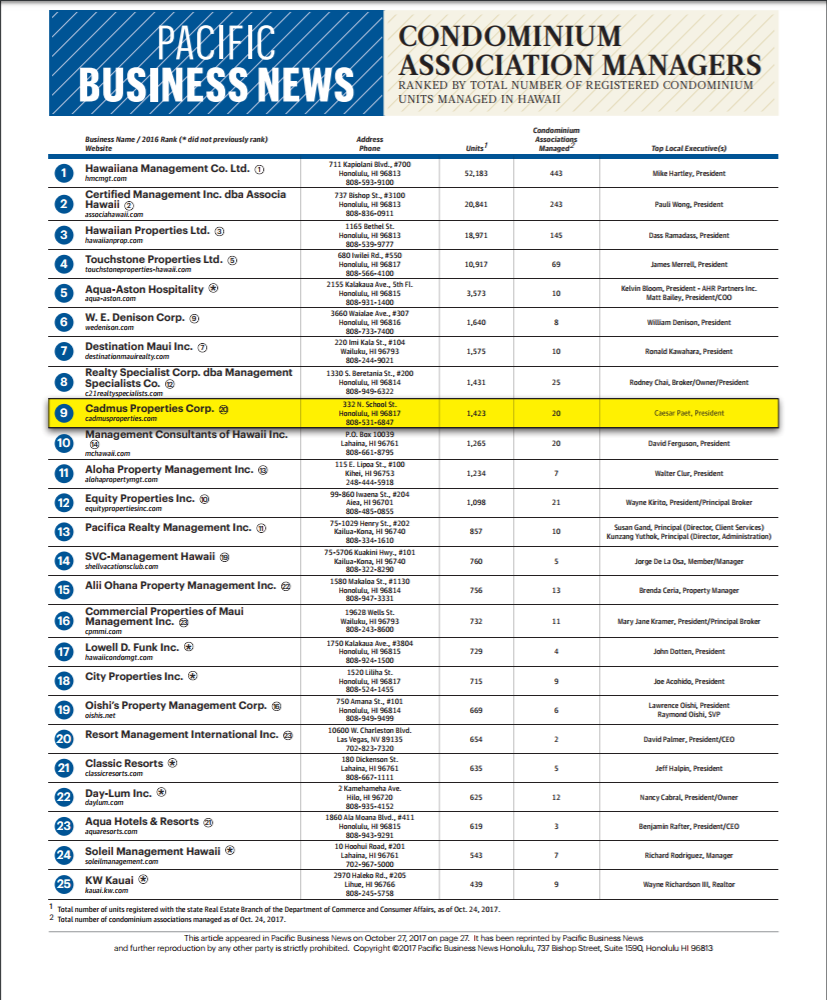COMPANY NEWS
Company News and Information

By Cj Paet
•
22 Apr, 2020
News Release from the Office of Consumer Protection DEPARTMENT OF COMMERCE AND CONSUMER AFFAIRS OFFICE OF CONSUMER PROTECTION DAVID Y. IGE GOVERNOR CATHERINE P. AWAKUNI COLÓN DIRECTOR STEPHEN H. LEVINS EXECUTIVE DIRECTOR, OFFICE OF CONSUMER PROTECTION FOR IMMEDIATE RELEASE April 1, 2020 STATE PROVIDES GUIDANCE FOR HOMEOWNERS AND RENTERS HONOLULU – The Office of Consumer Protection (OCP) is providing answers to the following Frequently Asked Questions (FAQS) to assist homeowners and renters and with inquiries regarding the Landlord-Tenant code. This FAQ along with more information regarding the Hawai‘i Landlord-Tenant code is available at https://cca.hawaii.gov/ocp/landlordtenant/ . Landlord Tenant FAQs Governor David Ige’s recent emergency proclamations concerning the coronavirus invoked special legal requirements applicable to Landlords and Tenants in Hawai‘i. The Office of Consumer Protection has created FAQs pertaining to how these provisions impact their legal relationship. The guidance provided is current as of March 31, 2020 and may be subject to change per actions taken at the state and/or federal level. I’m current on my rent, but my Landlord has informed me that I must vacate; can they do this? No. Unless there is a material breach of the lease or the premises are unfit for occupancy, a Landlord cannot currently require you to move. Governor David Ige’s State of Emergency Proclamation(s) automatically activates the provisions of section 127A-30(2) of the Hawaii Revised Statutes, which states, that “no Landlord shall terminate any tenancy for a residential dwelling unit in the area that is the subject of the proclamation…except for a breach of a material term of a rental agreement or lease, or if the unit is unfit for occupancy”. How long will the special provisions of section 127A-30(2) remain in effect? A state of emergency terminates automatically sixty days after the issuance of a proclamation of a state of emergency or by a separate proclamation of the governor, whichever occurs first. The date of termination may be extended by a new proclamation. Do I still have to pay my rent? Yes. You are still legally obligated to pay your rent. What if I can’t pay my rent? You should inform your Landlord if you are unable to pay your rent and explain why. Renters are advised to contact their landlords as soon as they can to talk through delayed or partial payment options. Can the Landlord evict me if I don’t pay my rent? Currently, the Hawaii Judiciary has issued several orders that impact the ability of Landlords and their agents to use legal process to evict a Tenant for non-payment of rent. The Judiciary has stated that legal proceedings relating to summary possession or eviction have been postponed to at least April 30, 2020. What this means is that absent extraordinary circumstances, no eviction orders will be issued until at least after April 30, 2020. I have already been served with an eviction notice; can I be evicted? If the eviction notice was validly issued by the court you may be subject to an eviction, however, the Sheriff’s Division of the Department of Public Safety, which often assists Landlords with the lawful removal of Tenants and their possessions, has stated that it will not be assisting anyone in the eviction process until further notice. What if I have a Tenant who is dangerous, or is engaging in illegal activity? Under these circumstances, a Landlord may go to court to seek relief, including petitioning the court for an order allowing for the lawful removal of the Tenant. How do I go to court to try to get a Temporary Restraining Order (TRO)? Petitions for Temporary Restraining Orders may be filed at the State District Court Courthouse. Please see the following link for information related to the district court in your jurisdiction: https://cca.hawaii.gov/ocp/files/2020/03/Courthouses-Info-3.30.2020.pdf Are the provisions of the Landlord Tenant Code still in effect? Thus far, the Landlord Tenant Code has not been suspended by any of the Proclamations issued by the Governor. Can a Landlord raise my rent? No. Pursuant to section 127A-30 of the Hawaii Revised Statutes a Landlord is prohibited from increasing rent during the period of the state of emergency declared by the Governor. Is a notice to increase rent before the issuance of the Proclamation still valid? In the case of a residential dwelling unit, if rent increases were contained in a written instrument, such as, a lease, that was signed by the Tenant prior to the Proclamation, the increases may take place pursuant to the written instrument. What if my rental is subject to a federal housing program? These rentals are subject to federal jurisdiction. Until July 26, 2020, property owners are prohibited from filing for eviction against or charging any fees for unpaid rent and fees to a tenant in properties with federally guaranteed loans or participating in federal housing programs. Property owners must also issue a notice to tenants to vacate 30 days before an eviction and the notice to vacate cannot be issued during this 120-day period. This protection covers properties that receive federal subsidies such as public housing, Section 8 assistance, USDA rural housing programs, and Low Income Housing Tax Credits, as well as properties that have a mortgage issued or guaranteed by a federal agency (including FHA and USDA) or Fannie Mae or Freddie Mac. Additionally, owners of multifamily buildings with federal loans in forbearance may not evict tenants for unpaid rent or charge late fees or penalties until the loan exits forbearance. Renters seeking information on whether they are covered by the moratorium should contact Legal Aid Society of Hawaii or a HUD approved housing counselor. You can find the nearest housing counselor here https://www.consumerfinance.gov/find-a-housing-counselor/ or by calling (800) 569-4287.
16 Jul, 2019
Handyman Exemption Increases to $1,500 After 27 years, we passed legislation increasing the handyman exemption from $1,000 to $1,500. The handyman exemption enables persons other than licensed contractors to perform tasks for which the aggregate contract price is less than $1,500. However this does not apply to projects which require a building permit or electrical or plumbing work. Also, the handyman exemption will only apply to labor and materials. “Taxes and all other items” was removed, so the General Excise Tax will no longer be included as part of the $1,500 exemption. The increased handyman exemption amount is effective as of July 10, 2019 and was enacted without the Governor’s signature. View the Law
19 Jul, 2017
Please support Cadmus Properties Corporation in raising funds to support local families suffering from Muscular Dystrophy. Every dollar helps. Please click on the link below to help Cadmus Properties raise funds to help families break free from muscular dystrophy and related diseases. Cadmus Properties MDA Lock Up
15 May, 2017
Aloha, It’s time to take a stand in support of the Honolulu City Council’s Resolution 17-70, CD1 to keep the Residential property tax rate at $3.50 and the two tier Residential A rate at $4.50 and $9.00. We all know that any increase in these rates will only add to the cost of housing for local families, whether they rent or buy. This is your chance to submit testimony to your City Councilmember and have your voice heard. The Resolution will be heard by the Special Budget Committee on Tuesday, May 16. We appreciate your participation in this Call For Action. If you have already shared your concerns with your Council member, we thank you. CLICK HERE – Submit Testimony Contact Nelson Higa at 792-7832 or email at nelson.higa@hicentral.com, for questions and/or additional information.





